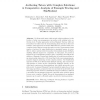Free Online Productivity Tools
i2Speak
i2Symbol
i2OCR
iTex2Img
iWeb2Print
iWeb2Shot
i2Type
iPdf2Split
iPdf2Merge
i2Bopomofo
i2Arabic
i2Style
i2Image
i2PDF
iLatex2Rtf
Sci2ools
AIED
2015
Springer
2015
Springer
Authoring Tutors with Complex Solutions: A Comparative Analysis of Example Tracing and SimStudent
Problems with many solutions and solution paths are on the frontier of what non-programmers can author with existing tutor authoring tools. Popular approaches such as Example Tracing, which allow authors to build tutors by demonstrating steps directly in the tutor interface. This approach encounters difficulties for problems with more complex solution spaces because the author needs to demonstrate a large number of actions. By using SimStudent, a simulated learner, it is possible to induce general rules from author demonstrations and feedback, enabling efficient support for complexity. In this paper, we present a framework for understanding solution space complexity and analyze the abilities of Example Tracing and SimStudent for authoring problems in an experimental design tutor. We found that both non-programming approaches support authoring of this complex problem. The SimStudent approach is 90% more efficient than Example Tracing, but requires special attention to ensure model compl...
| Added | 14 Apr 2016 |
| Updated | 14 Apr 2016 |
| Type | Journal |
| Year | 2015 |
| Where | AIED |
| Authors | Christopher J. MacLellan, Erik Harpstead, Eliane Stampfer Wiese, Mengfan Zou, Noboru Matsuda, Vincent Aleven, Kenneth R. Koedinger |
Comments (0)

